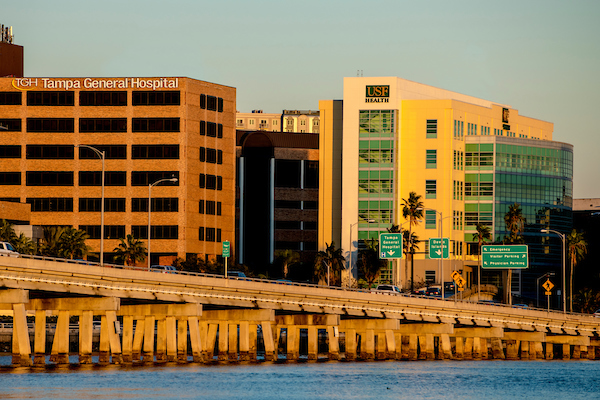USF Health researchers have launched several clinical trials as part of the world-wide effort to reduce the severity and even prevent COVID-19.
In connection with Tampa General Hospital, the USF Health researchers are leading the examination of a range of medications and treatment protocols that could impact the disease at a symptoms-level for patients and at the cellular level of the virus.
“The USF Health Office of Clinical Research and supporting parties are making strides that we’ve never made before,” said Rachel Karlnoski PhD, CHRC, director of Clinical Research Operations for USF Health.
“The typical start-up timeframe for new clinical trials in an academic medical center is 90 days or more. Our goal for COVID-19 trials was five days or less and we have succeeded. Communication, collaboration and prioritization from our budget and contract analysts, onsite legal counsel, USF IRB, central IRBs, investigators, study teams and regulatory manager have enabled our success.”

The united, expedited efforts paid off and now USF Health and TGH are conducting multiple front-line studies that link to larger efforts across the country, all in sync for finding treatments and cures for COVID-19.
“I am humbled by the response from our MCOM research staff, and their willingness to volunteer and put themselves at risk,” Karlnoski said. “We have over 30 volunteers from all departments comprised of nurses, coordinators, regulatory specialists, and data analysts who are ready to be deployed when a COVID trial becomes available. The silver lining behind the pandemic is the visibility it has brought to the importance of clinical research in the advancement of medicine. I am optimistic that we will find an effective treatment.”
One of the main overarching research efforts is the inclusion of data related to COVID-19 as part of a national registry tracking many aspects of the virus and those infected with it, such as pregnant women and their babies. USF Health and TGH providers are actively submitting information to this registry.
Among the clinical trials being set up or currently underway are:
- Testing sarilumab to determine effectiveness in blocking inflammation in the lungs in hospitalized severely ill patients.
- Two studies, one in adults and the other in children, are looking at the emergency use of remdesivir, an antiviral drug that may help kill the virus. These studies are for critically ill COVID-19 patients.
- Several studies looking at hydroxychloroquine, on three main fronts:
- For severely ill patients: Given to patients coming into the emergency department who are severely ill and are going to be hospitalized.
- For health care workers: A multi-site clinical trial involving 15,000 health care workers across the country to determine if hydroxychloroquine can prevent COVID-19.
- For outpatient use: Given to those who test positive for COVID-19 but are not severely ill and don’t need to be hospitalized.
- Using convalescent sera/plasma from people who have recovered from COVID-19 in those who currently have the disease to test the sera’s ability treat these COVID-19.
- Testing 3D printed nasal swabs to confirm their ability to prevent so many false negatives compared with standard swabs when used for testing for COVID-19.
- Testing in outpatient settings the use of inhaled nitric oxide to help treat patients with COVID-19 who require supplemental oxygen.
- Studying Ruxolitinib in critically ill patients with COVID-19 and the impact of the medication in easing or stopping the associated cytokine storm, when the patient’s immune system becomes overwhelmed and attacks healthy cells.
- Other studies are looking into ways for treating pneumonia associated with so many cases of patients with COVID-19; assessing the safety and anti-coronavirus response of combined suppression of host nucleotide synthesis in hospitalized adults with COVID-19; testing Brequinar, an antiviral drug for treating COVID-19.
For more information about these and other clinical research taking place at USF Health, please email the Office of Clinical Research at ocr@usf.edu
